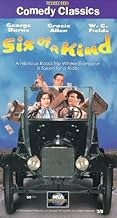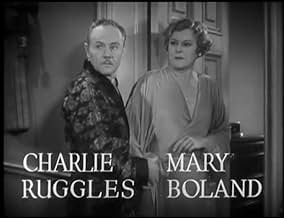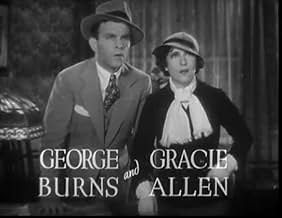When a respectable middle-class couple take a cross-country trip by auto, they share expenses with a decidedly oddball couple, none of whom know the car carries embezzled funds.When a respectable middle-class couple take a cross-country trip by auto, they share expenses with a decidedly oddball couple, none of whom know the car carries embezzled funds.When a respectable middle-class couple take a cross-country trip by auto, they share expenses with a decidedly oddball couple, none of whom know the car carries embezzled funds.
- Awards
- 1 win total
- J. Pinkham Whinney
- (as Charlie Ruggles)
- Traffic Cop
- (uncredited)
- Hotel Desk Clerk in Philipsburg
- (uncredited)
- Eyeshade Man
- (uncredited)
- Detective
- (uncredited)
- Woman
- (uncredited)
- Gillette's Secretary
- (uncredited)
- Drunk
- (uncredited)
- Tourist's Wife
- (uncredited)
Featured reviews
But the value of "Six of a Kind" is more an artifact of particular players forever captured on film. Mary Boland is always excellent and she's wonderful here (but at her best a few years later in "The Women"). Charlie Ruggles essentially played the same role all his career and nobody plays Charlie Ruggles better. Alison Skipworth is barely utilized at all, here.
It's the preservation of W.C. Fields' immortal "Honest John" routine from vaudeville that earns "Six of a Kind" its place in film history. It's difficult to imagine how this routine worked from the distance of a stage. But on film it's a miracle of comic construction, timing, delivery and skill (yes he actually ricochets that billiard ball off the far end of the table where it bounces back and hits his forehead). The routine is hypnotic and hysterical, and perfectly pitched for film.
The Fields poolplaying routine is priceless. I've seen it before but cannot recall where. But its inserted into this project without reference to anything else. Incidentally, it works as well as it does because there is a watcher in the frame, a deadpan face that is every bit as valuable and practiced as the actor.
That's indicative of how the experiment fails as a whole. If you know "Mad Mad Mad World," you'll know a successful example where comedic methods actually do bump up against each other and generate something resonant, rich, higher.
In this case however, the comedic models take turns. Isn't as effective.
Ted's Evaluation -- 2 of 3: Has some interesting elements.
Ruggles and Boland make you laugh at them, with them, and for them; Burns and Allen take silly to a new level; and Fields and Skipworth show up later in the game to round out this sextette of psychos. Fields' billiard scene (reworked from one of his earlier films) is not to be missed.
Did you know
- TriviaW.C. Fields refers to a woman named McGonigle. He took that name for his character in The Old Fashioned Way (1934). The actor had also used the name McGargle in Sally of the Sawdust (1925) and its remake, Poppy (1936).
- GoofsGeorge Burns' character Name is shown onscreen as "George Edward", but "Edwards" is consistently spoken as his surname.
- Quotes
Gracie De Vore: Oh, what's that?
George Edwards: You wouldn't understand. This is a map.
Gracie De Vore: Oh, sure, I know what a map is. It's what you take every afternoon when you're tired. I always take an afternoon map.
George Edwards: An afternoon map?
Gracie De Vore: Sure.
George Edwards: I bet when you went to school, you never even reached the fifth grade.
Gracie De Vore: Aw, don't be silly. I spent three of the happiest years of my life in the fifth grade.
- ConnectionsFeatured in L'univers du rire (1982)
Details
- Runtime
- 1h 2m(62 min)
- Color
- Aspect ratio
- 1.37 : 1





































